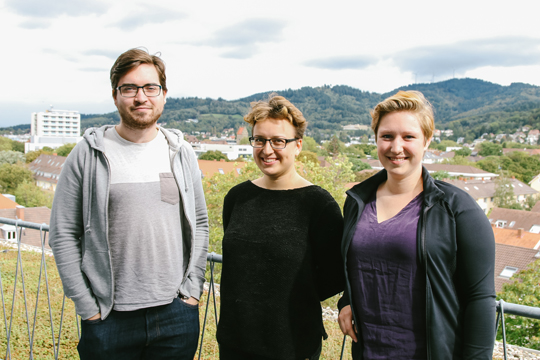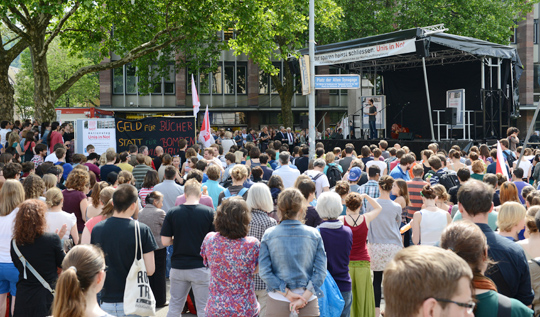Be Seen, Be Heard, Be Convincing
Freiburg, Oct 22, 2019
Put simply: it’s about money – and about the future. Currently the Stuttgart-based Baden-Württemberg Ministry of Finance is negotiating with the region’s universities. This will conclude in the signing of an agreement to cover higher education funding for the years 2021 to 2025. The discussions are tough, and nothing has been decided yet. So representatives of the student bodies and the university boards want to put more pressure on politicians: on 30th October 2019 students and staff will be taking to the streets together. Lou Mollat and Carlotta Rudolph who have been part of the board of the University of Freiburg’s student government, and Clemens Ernst who held the same post before them, want to encourage their fellow students to join in the demonstration. Rimma Gerenstein asked the three of them why they got involved.

Placards and a loud voice: Baden-Württemberg’s universities are demonstrating on 30th October 2019. Photo: wellphoto/stock.adobe.com
Student bodies and rectorates throughout the region are sounding the alarm: there’s not enough money; research and teaching are severely threatened. Have you noticed signs of this in your everyday lives on campus?
Lou Mollat: Of course. A simple calculation shows it clearly: today universities receive 3,450 euros less per student than in 1998. At the moment nearly 25,000 study places in Baden-Württemberg receive absolutely no funding from the state, that’s almost as much as Freiburg University. This deficit is having a severe effect on the quality of teaching; for instance, the University Library had to stop offering 24 hour opening. The lecture theaters are overfilled …
Carlotta Rudolph: … How are you supposed to learn if you can’t even find somewhere to sit? There’s a lack of teachers, a lack of rooms; courses are canceled abruptly, teachers can’t offer enough contact time. I think every student is aware of it, really.
Clemens Ernst: Many of these problems are known and basically come down to the uni not having any money. But it also applies to issues that not every student is aware of. For example, take the representative for students with a disability or chronic illness. It’s a role that affects roughly a tenth of all the students at Freiburg University, so around 2,000 students. There’s one person who is responsible – she’s very capable, but she’s just one person in a part-time post.

Clemens Ernst, Lou Mollat and Carlotta Rudolph (l to r) are convinced that Freiburg can put on a good show and stand up against the underfunding of universities. Photo: Max Orlich
Lou Mollat: According to the State University Law, the university is also obliged to help students’ achieve social mobility and appoint staff to deal with issues such as diversity or removing barriers to studying. If they don’t have enough basic funding then this is only possible to a very limited extent, or maybe not at all. Another current issue is the renovation of dilapidated buildings. A lot of money needs to be put in to them to keep them in good condition.
Carlotta Rudolph: Insufficient funding also affects the people who work for the university. A lot of students who have had the occasional student assistant job know the situation: contracts are only offered for very short periods, or the jobs are completely cut from one semester to the next.
Clemens Ernst: Having one short-term contract after another isn’t just an issue for student assistants. It’s not that students like us simply want more money, and don’t care about anything else. It’s about the university as a whole, everyone is suffering from too little money: teachers, research, administration, services and technology.
So what exactly are you calling for?
Lou Mollat: Basically, the Landes-Asten-Konferenz (LAK) is calling for an increase of 1,000 euros per student, the transfer of program funding to basic funding and an inflationary adjustment for past years.
Clemens Ernst: As students we can’t define at what point things are fully funded. For instance, the state universities are calling for a total one-off top-up of 172 million euros to get back on a sound footing, and 115 million euros in order to be able to properly implement things such as digitization and infrastructure. We go along with this and other demands.

The face of the “No science, no future” campaign is Johannes Kepler (1571 – 1630), who was one of the founders of modern science. Source: Baden-Württemberg state Rectors’ Conference
On 30th October 2019 students and staff will be taking to the streets together.
Lou Mollat: Yes, this protest day is the initiative of the LAK, and the Baden-Württemberg state Rectors’ Conference is also supporting the campaign. There will be demonstrations throughout Baden-Württemberg. In Freiburg we’ve brought the Rectorate and the other universities on board too, and we’ve formed a university funding alliance which includes a lot of different groups and institutions.
Carlotta Rudolph: We start from the Platz der Alten Synagoge at noon and will march through the city center for about two hours. There’s a program of events before and after, a stage, music and speeches by representatives from various interest groups. We want to take a public stand for a whole day and show that the universities are important to the region, that science, the economy and politics depend on them. It’s a subject that unites a lot.
Clemens Ernst: Exactly: we want to show that university funding doesn’t just concern a small group. That it isn’t, as some say, students want to study at the expense of everyone else, and then they benefit from it but no one else does. They have to hear the message in Stuttgart: it involves a lot of people.

In 2017 nearly 3,000 researchers, teachers and students demonstrated in Freiburg at the “March for Science”. Photo: Sandra Meyndt
Do you think your fellow students will join in? Interest in higher education policy is really a niche concern for students.
Lou Mollat: The key word is information. We want to reach a wide audience and make it clear to people that they are very directly affected by the decisions in Stuttgart. So we’re taking every opportunity to do this. The courses in the first semester are a particularly good place to do this.
Carlotta Rudolph: When you start to look at higher education policy, you suddenly realize how things are connected. Of course there’s a reason why there is a shortage of staff or rooms: there simply aren’t enough resources, the universities and colleges are underfunded. We want to establish this connection and show people: if you get involved you can change, improve your situation.
Clemens Ernst: I think that Freiburg can mobilize. And that people will be taking to the streets, because their future will be decided by this university funding contract.

There was also a state-wide day of action in 2014 – back then negotiations were underway for the current university funding contract. The slogan was “Unis in Need”. Photo: University of Freiburg
Not every interest group agrees that universities should have more money. Put another way: funds are limited. Many find it more important for instance that their children can learn in classrooms where the rain doesn’t come in.
Carlotta Rudolph: Of course, and I also think the money would be well invested there. People shouldn’t play different groups off against one another. We don’t see the interests as competing, we want to stand up together for education as a whole.
Clemens Ernst: The problem goes far deeper. Baden-Württemberg is a very rich state which has huge revenues and forms huge reserves. So the state doesn’t have a cash problem, but every year it aims to break even. But by doing this it commits to not investing in the future. At the same time the universities have proven their worth many times: for every euro that the state invests in the universities, they generate 2.80 euros. That’s a return that would be highly acceptable in business. I don’t understand why the state is so cautious about this.
At the moment the student governments are attempting to mobilize their fellow students throughout the region to take part in the day of protest. What do you need to demonstrate properly?
Carlotta Rudolph: Bring something to drink and a snack – nuts for example are good to have. And at the end of October it can be a bit cool in Freiburg, so don’t forget weatherproof clothing.
Lou Mollat: Placards and banners shouldn’t be overlooked. And a loud voice.
Clemens Ernst: We want to be seen, heard and convincing – anything you can think of to help can’t be far wrong.
Protest in October
Students and staff want to take a joint stance against the inadequate funding of Baden-Württemberg’s universities: On the initiative of the Landes-Asten-Konferenz a protest day will take place on 30th October 2019 throughout Baden-Württemberg under the title “Hochgeschult – kaputtgespart”. The Baden-Württemberg state Rectors’ Conference is supporting the protest with its “No science, no future” campaign. In Freiburg the demonstration begins at 12 noon at the Platz der Alten Synagoge.
hochgeschult-kaputtgespart.de
nosciencenofuture.de

